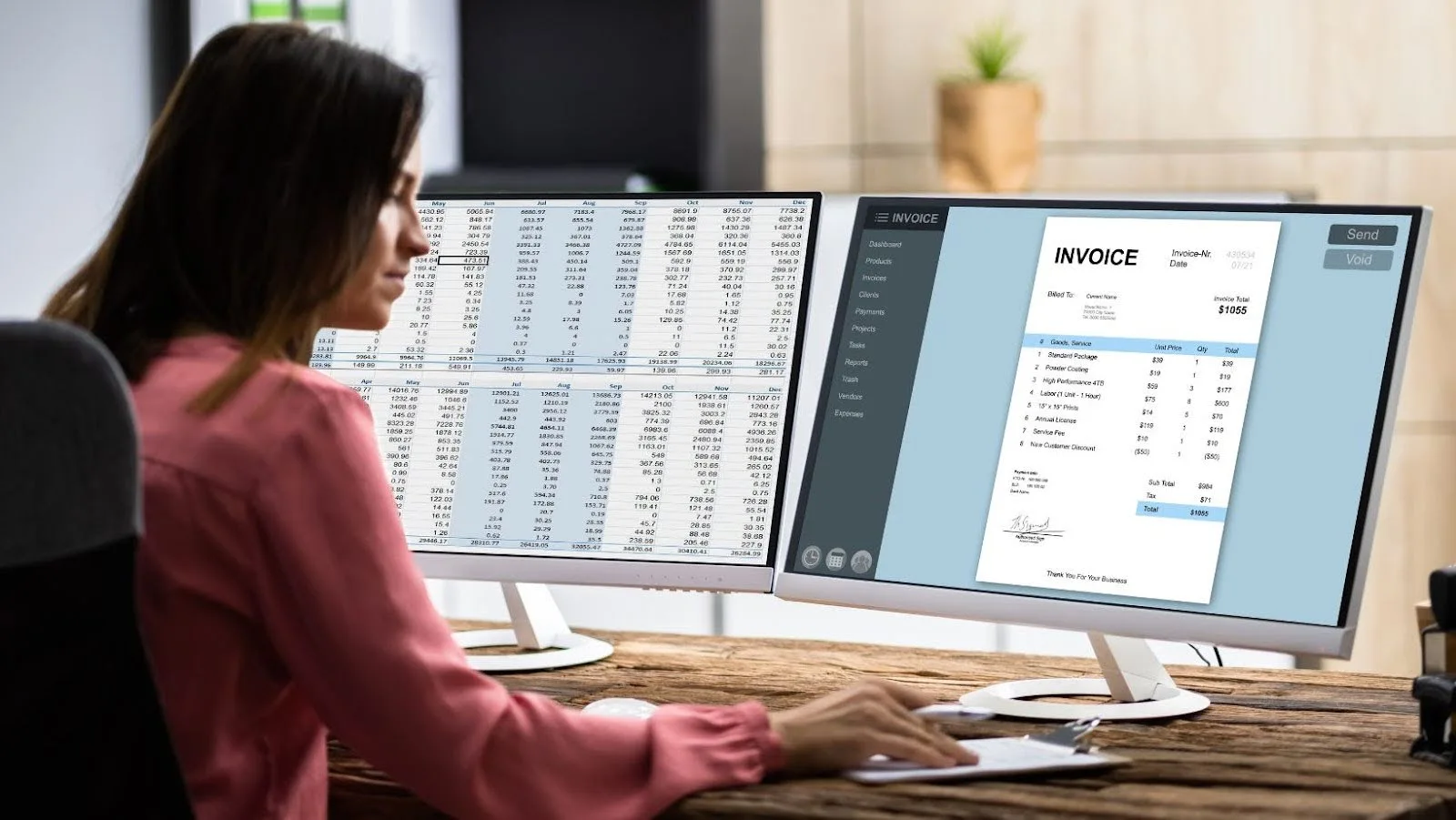The Role of Technology in Modern Accounting: A Guide for Job Seekers
Gone are the days of manual bookkeeping and cumbersome spreadsheets. Modern accounting is all about leveraging technology to streamline processes, analyze data, and make informed decisions. Whether you’re a seasoned accountant or a job seeker entering the field, understanding the pivotal role of technology is paramount.
Modern accounting is more than just crunching numbers; it’s about providing strategic insights and ensuring compliance with regulations. Thanks to advancements like cloud computing and automation, accountants now have powerful tools at their disposal. From software that automates mundane tasks to sophisticated analytics platforms, technology has revolutionized the way accountants work.
Technology has transformed the accounting profession, making it more efficient and adaptable. For job seekers, proficiency in accounting software is essential. Platforms like QuickBooks and Xero have become industry standards, while data visualization tools like Tableau offer valuable insights. Embracing technology isn’t just about keeping up—it’s about staying ahead and thriving in a rapidly evolving field.
Evolution of Accounting Technology
The impact of technology on accounting has been profound, reshaping the profession from manual record-keeping to highly automated processes. With key milestones including the introduction of calculators, computers, internet-based software, and the integration of artificial intelligence and machine learning for advanced analytics.
Accounting technology has come a long way since its inception. Historically, accounting was a labor-intensive process, relying heavily on manual record-keeping and calculations. Paper ledgers and handwritten entries were the norm, making tasks time-consuming and prone to errors.
Over the years, technological advancements have revolutionized the accounting landscape. The introduction of the calculator in the mid-20th century marked a significant milestone, streamlining calculations and reducing human error in financial statements. The advent of computers in the 1970s further transformed accounting practices, allowing for the automation of tasks and the creation of digital databases.
Current Technological Landscape
The current technological landscape in the accounting industry is essential for businesses, providing streamlined operations, improved accuracy, and informed decision-making. Artificial intelligence tools such as Sage Intacct and Receipt Bank automate tasks and provide valuable insights, allowing accountants to focus on higher-value tasks and boost productivity.
In addition, blockchain technology is transforming financial transactions by providing a secure, decentralized ledger system, offering increased transparency, traceability, and security. Within accounting, blockchain integration, led by platforms like IBM Blockchain and Hyperledger, is reducing the risk of fraud and errors, paving the path for more efficient and reliable financial management processes. These advancements collectively empower accountants to drive efficiency and value in today’s dynamic business environment, shaping the future of the profession.
Skills for Modern Accounting Professionals
Modern accounting professionals must continually enhance their skills to meet the demands of the digital age.
Data Analytics Proficiency
Modern accounting professionals must possess strong data analytics skills to interpret financial data effectively. Analyzing trends, forecasting, and extracting insights from large datasets enable accountants to make informed decisions and provide strategic guidance to businesses.
Cybersecurity Awareness
In the current era of technology, being aware of cybersecurity is crucial to safeguarding confidential financial data. Accountants need to understand cybersecurity risks, implement robust security measures, and stay updated on best practices to safeguard against cyber threats and data breaches.
Automation and Programming Skills
Automation and programming skills are becoming increasingly important in accounting roles. Proficiency in tools like Excel macros, Python, or SQL enables accountants to automate repetitive tasks, streamline processes, and manipulate data more efficiently, ultimately saving time and improving productivity.

Impact on Job Roles
Technology has profoundly impacted accounting job roles by automating traditional tasks, allowing accountants to focus on higher-value activities like analysis and decision-making. Emerging specializations such as data analysis and cybersecurity now require a mix of accounting knowledge and technological proficiency, reshaping the skill sets needed for success in the field.
Changing Nature of Accounting Jobs
The rapid evolution of technology is reshaping the nature of accounting jobs. Traditional tasks like data entry and reconciliation are increasingly being automated, allowing accountants to focus more on analysis, interpretation, and strategic decision-making.
Emerging Specializations in Tech-Driven Accounting
With advancements in technology, new specializations are emerging within the accounting field. These include roles such as data analyst, cybersecurity specialist, and automation expert. These specialized roles require in-depth knowledge of both accounting principles and technology, enabling professionals to leverage advanced tools and techniques to address complex financial challenges and drive innovation in the industry.
Software and Tools Overview
Accounting apps like QuickBooks, Xero and Freshbooks are prominent in the market, offering comprehensive solutions for tasks such as bookkeeping and financial reporting, thereby enhancing efficiency across businesses of all sizes. These platforms dominate the industry with user-friendly interfaces and robust features that streamline accounting processes.
Complementing these mainstream solutions are specialized tools like Expensify for expense management and Gusto for payroll processing. Furthermore, advanced analytics platforms like Tableau and Power BI address the growing demand for data analysis, empowering accountants to make informed decisions.
Together, these popular accounting software options cater to the diverse needs of modern accounting practices, facilitating smoother operations and improved productivity.
Training and Certification Opportunities
Training and certification opportunities abound in the accounting field, with recognized certification programs such as the Certified Public Accountant (CPA), Chartered Accountant (CA), and Certified Management Accountant (CMA) offering professionals and accounting firms the opportunity to validate their expertise and advance their careers in accounting. These certifications are highly regarded in the industry and can open doors to new opportunities and higher earning potential.
Online training platforms like Coursera, Udemy, and LinkedIn Learning provide convenient and flexible options for accountants to upskill and stay updated with the latest trends and technologies in the field. These platforms offer a wide range of courses covering topics such as financial analysis, tax preparation, and software proficiency, allowing professionals to customize their learning experiences to fit their schedules and career goals.
Job Search Strategies
In navigating the job market for tech-driven accounting roles, it’s crucial to customize resumes to showcase relevant technical skills and leverage digital platforms like LinkedIn for networking opportunities, enhancing your chances of securing desired positions.
Tailoring Resumes for Tech-Driven Roles
When applying for tech-driven accounting roles, it’s important to customize your resume to highlight relevant technical skills and experiences, such as proficiency with accounting software, data analysis tools, and programming languages. Emphasizing these qualifications can make your application stand out to employers seeking candidates who can thrive in a digital environment.
Networking in the Digital Age
Networking remains a significant aspect of job searching, even in the digital age. Utilize online platforms like LinkedIn to connect with professionals in your industry, join relevant groups, and participate in discussions to expand your network. Consider attending virtual networking events and webinars to meet potential employers and gain valuable insights into the job market.
Challenges and Opportunities
Professionals encounter challenges adapting to technology while also finding opportunities in specialized career paths. By addressing these challenges through learning and seizing career opportunities, accountants can navigate the industry’s complexities and achieve success.
Addressing Technology-Related Challenges
As technology continues to evolve, accountants face challenges such as adapting to new software and staying updated with technological advancements. Overcoming these challenges requires continuous learning and upskilling to remain competitive in the field.
Capitalizing on Career Opportunities
Despite challenges, technology also presents numerous career opportunities for accountants. Specializing in areas such as data analytics, cybersecurity, or automation can open doors to lucrative roles and career advancement. By embracing technology and acquiring relevant skills, accountants can position themselves for success in the rapidly changing landscape of accounting.
Future Trends in Accounting Technology
Future trends in accounting technology include the increasing use of predictive analytics for financial forecasting and the continuous integration of artificial intelligence, streamlining processes, and providing real-time insights for financial management.
Predictive Analytics in Financial Forecasting
The future of accounting technology lies in predictive analytics, enabling more accurate financial forecasting and strategic decision-making. By analyzing historical data and identifying patterns, accountants can anticipate future trends and risks, empowering businesses to proactively plan and adapt to changing market conditions.
Continuous Integration of AI
Artificial intelligence will continue to play a central role in accounting, with advancements in machine learning algorithms enabling automation of tedious tasks and data analysis. As AI becomes more integrated into accounting software, accountants will have access to real-time insights and predictive capabilities, revolutionizing the way financial information is processed and interpreted.
Summary of Key Takeaways
Technology plays a central role in accounting, revolutionizing the profession and shaping its future direction. Significant advancements have streamlined processes, improved efficiency, and provided valuable insights for decision-making. Accountants must adapt by mastering data analytics, maintaining cybersecurity awareness, and acquiring automation and programming skills to navigate the dynamic technological landscape successfully.
Looking ahead, future trends in accounting technology, such as predictive analytics and the continuous integration of artificial intelligence, promise to further revolutionize the profession. By staying informed, adaptable, and proactive, accountants can leverage technology to drive innovation, efficiency, and value in the ever-evolving field of accounting. Through continuous learning, strategic networking, and embracing technological advancements, accountants can position themselves for success in the rapidly changing landscape of modern accounting.
Hire Professional Accountants – Contact Gables Search Group!
